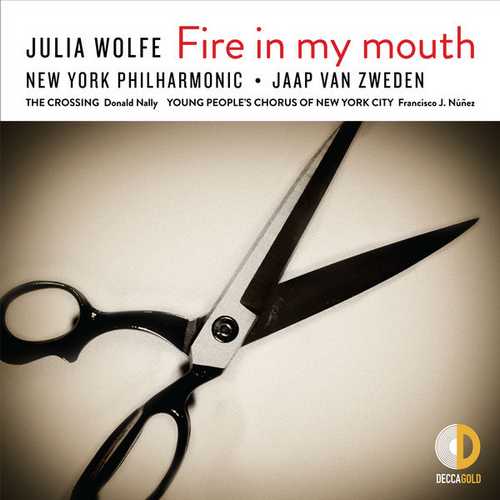

Composer: Julia Wolfe
Performer: Crossing, Young People’s Chorus of New York City
Orchestra: New York Philharmonic Orchestra
Conductor: Jaap van Zweden, Donald Nally, Kevin Vondrak, Francisco J. Núñez
Format: FLAC (tracks)
Label: Decca
Catalogue: 4818606
Release: 2019
Size: 967 MB
Recovery: +3%
Scan: cover
Fire in my mouth
01. I. Immigration
02. II. Factory
03. III. Protest
04. IV. Fire
Hope, depression, anger and sorrow: Fire in my Mouth takes us through the various stages of grief but its main message – of fairness and equality to all humans, regardless of race, ethnicity, gender or background – is one that remains worryingly relevant to our times, and one that is communicated with sobering urgency, energy and immediacy in Wolfe’s gripping work.
Composer Julia Wolfe builds large structures out of propulsive musical materials that may often take on a sinister tinge. Her works are tremendous crowd-pleasers even as they take up often grim subject matter. Fire in My Mouth, an hour-long oratorio, is perhaps her most epic work yet. For two women’s choirs and large orchestra, including a pair of scissors, the work involves a musical depiction of the Triangle Shirtwaist Factory fire of March 25, 1911, in which 146 workers, mostly young immigrant women, died after a fire broke out, and they found the building’s doors locked. The fire itself, gripping indeed, comes in the final fourth movement, and the work is tightly constructed leading up to that terrifying moment. The first three movements mix the hopeful attitudes of the women with the maw of the industrial hell that awaits them. Wolfe’s basic pulsing material is inflected in different ways as the music proceeds. The second movement, with a long percussion opening, represents the factory where the women would die, while in the third movement, they alternate between hopes of assimilation (“I want to talk like an American”) and protest. It’s an extraordinarily powerful work that will receive many future hearings, perhaps in observances of American labor history. Jaap van Zweden and the New York Philharmonic, who commissioned the work, bring urgency to these live performances, and the choirs — Philadelphia’s The Crossing, and especially remarkably the Young People’s Chorus of New York City — have not a trace of rote drill in this powerful material. Highly recommended, and here’s hoping the work comes to a symphony hall near you.